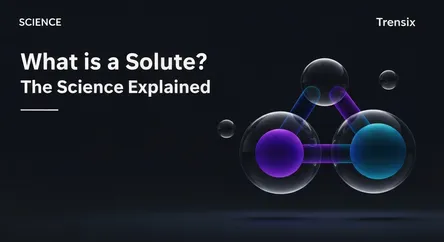Science
What is a Solute? The Science Explained

A simple explainer on what a solute is, the substance that dissolves in a solvent to create a solution, and its importance in our daily lives.
What is it?
A solute is the substance that is dissolved in another substance, known as the solvent, to form a homogeneous mixture called a solution. Typically, the solute is the component present in a smaller amount compared to the solvent. A common everyday example is salt (the solute) dissolving in water (the solvent) to create saltwater. Solutes can exist in any phase of matter: solid, liquid, or gas. For instance, in a carbonated beverage, the carbon dioxide gas is the solute dissolved in the liquid water. The concentration of a solution is determined by the amount of solute dissolved within the solvent.
Why is it trending?
While a fundamental concept, the study of solutes is central to many trending scientific fields. In environmental science, understanding how solutes like salts impact freshwater sources is a growing concern, leading to what researchers call "Freshwater Salinization Syndrome". In health and wellness, the concentration of solutes in bodily fluids is crucial for hydration, with recent studies linking it to sleep quality. Furthermore, in technology, the behavior of solutes is at the heart of innovations in energy storage. "Solvation engineering," which studies the interaction between solutes (ions) and solvents (electrolytes), is pivotal for developing safer and more efficient lithium-ion batteries.
How does it affect people?
Solutes are integral to everyday life and biological processes. Our bodies rely on solutions; for example, blood plasma is a solution where vital solutes like oxygen, minerals, and nutrients are transported. We encounter solutes constantly in the kitchen, from dissolving sugar in coffee to salt in cooking water. Many commercial products are solutions, including vinegar, cleaning agents, and antifreeze. On a larger scale, managing solute concentration is critical in industries like agriculture and in processes such as desalination, which removes salt solutes from seawater to produce drinking water, addressing global water scarcity.